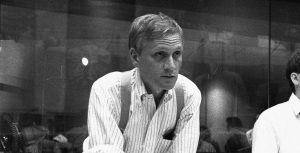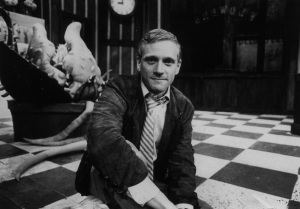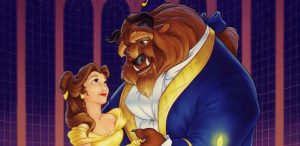Howard is yet more proof that one of the Disney+ streaming platform’s greatest strengths, despite an overall lack of original content, is its catalog of documentaries – not all of which, to be fair, were created exclusively for the service. Between this, Into The Unknown: The Making Of Frozen II, The Imagineering Story and Waking Sleeping Beauty, viewers are in for a treat if they ever seek out this particular genre on Disney+. Unfortunately, it remains one of the service’s better kept secrets that all these films and miniseries’ are even on there at all. Howard, which explores the life and times of one of the studio’s most celebrated songwriters as well as the impact he had on the Disney Renaissance, is neither the most illuminating nor the most well-made of these documentaries, but it is a welcome addition to the collection – and like the rest, it affords us a much-needed glimpse behind the curtain into the making of Disney magic: particularly the blood, sweat and tears that goes into the creative process.

Now, if you’re already familiar with many of the details of Howard Ashman’s story (and/or if you are subscribed to the superb Dreamsounds channel on YouTube, which examines Disney music through an LGBTQ+ lens and as a result focuses several video essays around Ashman), then Howard probably won’t be anything too groundbreaking. The film goes over all the pivotal moments in Ashman’s life, from his youth to his accomplishments in musical theater and film, to his tragic death from AIDS, before closing off with a look back at his legacy – accompanied by a montage which includes footage from Disney’s live-action remakes of Beauty & The Beast and Aladdin – but while it does also dig a little deeper into his personal life it still feels distanced and a bit cold until the very end: though this could be because the film only uses voiceover from the people who knew and loved Ashman to narrate a long string of old photographs, snippets of footage, etc, rather than allowing us to attach faces and, most importantly, real emotions to the names of the interviewees.
Probably the most important element of the film is how it tackles the latter period of Howard Ashman’s life, while he was simultaneously turning out some of his greatest work for Disney and also suffering from AIDS. The documentary appropriately doesn’t make the whole story about Disney (though you might think that’s the case early on, as Ashman’s sister recounts how as a child he used to create fantastical stories about magic and made-up characters), nor does it gloss over the horrors of the AIDS epidemic: the 1980’s was a terrifying and extremely dangerous place for gay men, which the documentary makes very clear by recounting how Ashman kept his illness a closely-guarded secret until near the end of his life for fear of losing his insurance and being fired by Disney. Just because he was working for a studio with a reputation for charming, happily-ever-after fairytales doesn’t mean he was oblivious to the reality that at the time (and even now, to some extent), there was no surety that Disney was an LGBTQ+ friendly company or that they would accommodate his needs (they did, much to Ashman’s relief; sending their teams of animators and writers to his home in upstate New York rather than requiring him to fly back-and-forth between the East and West coasts, and continuing to involve him in the songwriting process for Aladdin while he was hospitalized).

The gay subtext that Ashman is believed to have put into the music he wrote for Disney is also addressed (though again, if you want to know more about it, I recommend the Dreamsounds channel, which covers this topic in much greater depth). Both Part Of Your World, the iconic “I Want” song from The Little Mermaid that Ashman fought for despite Disney CEO Jeffrey Katzenberg’s objections (the “I Want” song wasn’t Ashman’s invention, but he certainly popularized the term) and The Mob Song from Beauty & The Beast are often believed to have LGBTQ+ themes, though only The Mob Song is brought up to prove this point in the film, with parallels being drawn between the townsfolk’s fear/hatred of the Beast, which results in them marching with pitchforks, gun and torches to kill him, and society’s fear/hatred of the LGBTQ+ community, which expressed itself in similar, and no less brutal, violence. A counterargument is provided that Howard Ashman wasn’t projecting his own experience into the lyrics of his songs, but was instead stepping into the shoes of the characters with the help of his remarkable amount of empathy, but it can’t be argued that a large part of his empathy with the struggles of misunderstood and mistreated characters like Ariel and The Beast is likely to have stemmed from his own struggles being accepted in a homophobic society.
Following the course of one man’s real life story leads us inevitably to Howard Ashman’s last days on earth, with his working partner Alan Menken, The Little Mermaid star Jodi Benson and others sharing their last memories of him, including a prophetic dream of the lyricist wearing black robes which Menken had on the same morning as Ashman’s passing. It goes without saying that the last couple of minutes of the documentary are an emotional ride.

Howard Ashman was able to get a lot done in his life, and several of the interviewees note that his frustration at having so little time left often motivated him to work even harder during his last years. Despite only working on a handful of films for Disney, Ashman shaped the future of the studio, its storytelling and its music, and he continues to impact the way they craft their animated films to this day. The whole Disney Renaissance is largely because of him and the way in which he was able to seamlessly reinvent the studio’s formula to closer match that of the Broadway musicals which he loved. On the stage, of course, he was responsible for the legendary Little Shop Of Horrors musical and was involved with the subsequent film adaptation, which is itself getting a remake sometime in the near future. And he is particularly notable for being able to accomplish so much of this while working as an openly gay man, no easy feat in any time period. In the documentary, he is heard humbly admitting that he doesn’t think of himself as a trailblazer – but there is no question that he was one of the most brilliant minds in music during his time, and that his influence will continue to be felt for a very while.
Movie Rating: 7.5/10